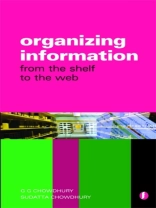Tomorrow’s LIS professionals will have to be conversant with all the tools and techniques for organizing information in different domains – from the traditional library shelf to full-scale digital libraries. This core text covers the organization of the entire spectrum of information, and the principles, tools and techniques needed to do this effectively. The most up-to-date textbook yet available on this subject, this comprehensive book covers everything from traditional cataloguing and classification through to metadata, information architecture and the semantic web. Written by experienced academics in the area, who have authored several other successful textbooks, this book provides both an overview of the whole field of information organization and an easy-to-understand introduction to each of the individual topics, which can be followed up with further study by following the references at the end of each chapter.The chapters cover: organizing information – what it means; organizing information in different non-library environments; cataloguing; bibliographic formats – MARC21 and others; library classification; subject heading lists and thesauri in information organization; organization of internet information resources; metadata; markup languages; ontology; information architecture; the semantic web; and, information organization – issues and trends. A key student text for all information and library studies courses, the book is also valuable for practising LIS professionals who need to gain an understanding of the various tools and techniques required to master information organization.
Inhaltsverzeichnis
1. Organizing information: what it means 2. Information organization in non-library environments 3. Cataloguing 4. Bibliographic formats: MARC 21 and others 5. Library classification 6. Subject heading lists and thesauri in information organization 7. Organization of internet information resources 8. Metadata 9. Markup languages 10. Ontology 11. Information architecture 12. The semantic web 13. Information organization: issues and trends.
Über den Autor
Professor Gobinda Chowdhury BSc Hons, MSc, Ph D, FCLIP is Professor in Information Science at i School@northumbria, and Head of the Department of Mathematics and Information Sciences at Northumbria University. Before joining Northumbria University he was a Professor and Director of the Centre for Information and Knowledge Management at the University of Technology Sydney, Australia. For over 25 years he has worked as an academic and researcher in information science in different parts of the world including Asia, Africa, Europe and Australia. For the past few years he has been actively involved in the i Schools activities. Professor Chowdhury has written or edited 15 books and over 150 research papers.












